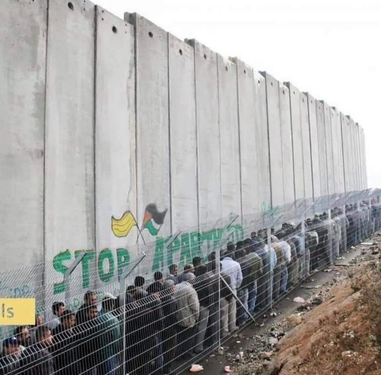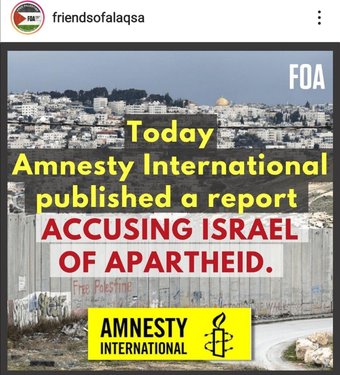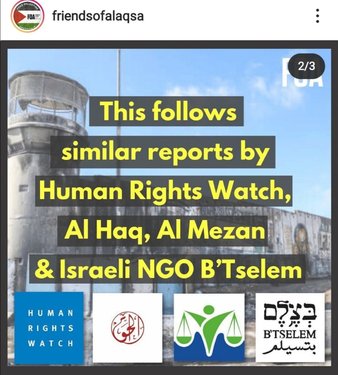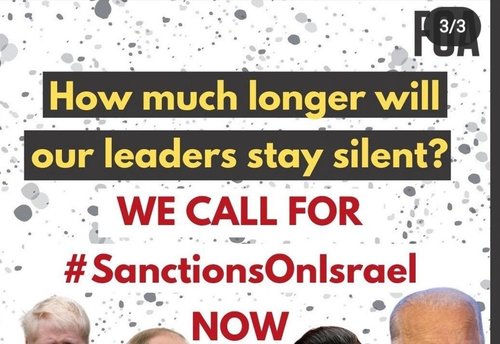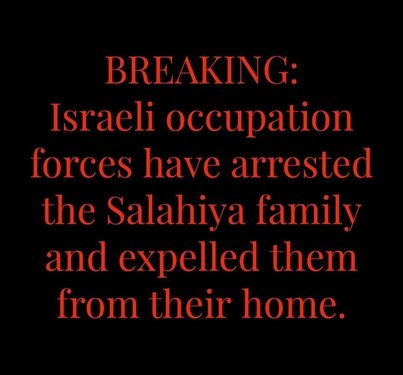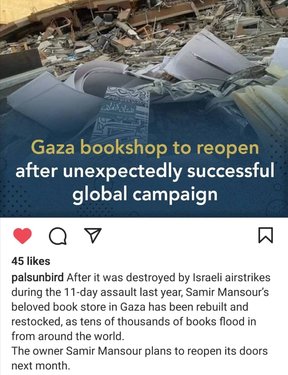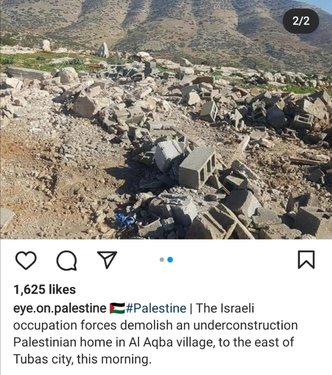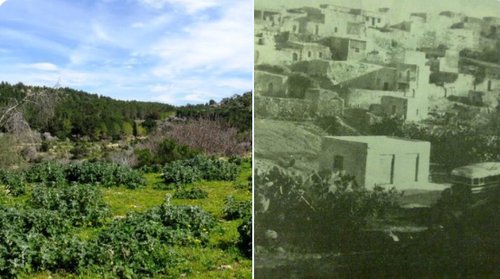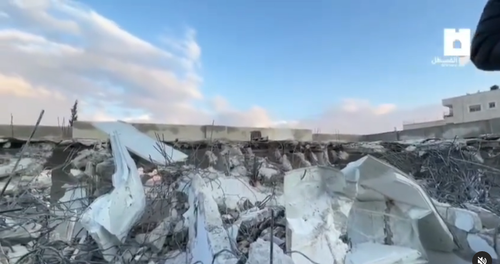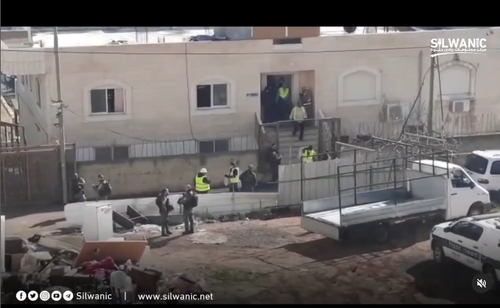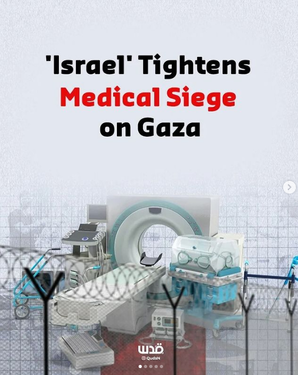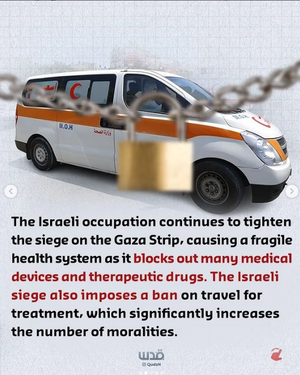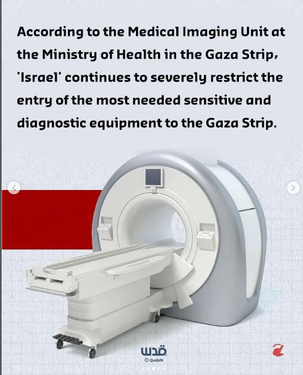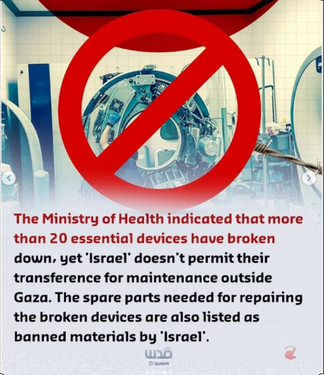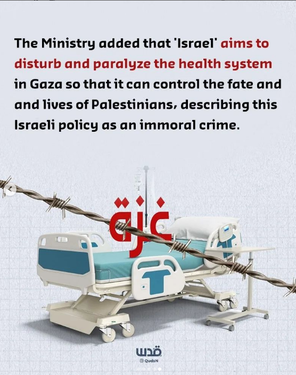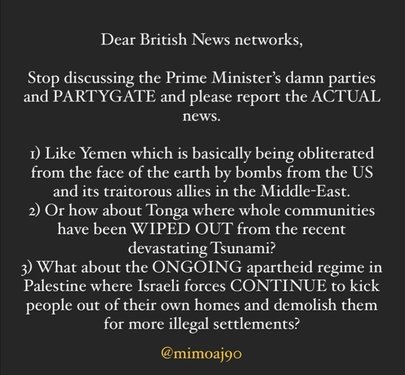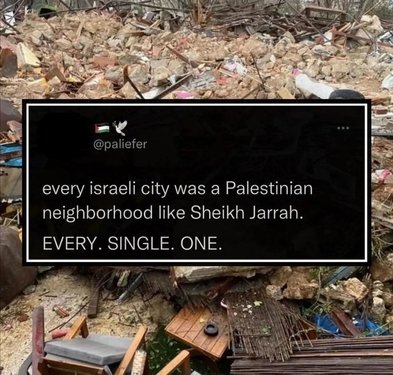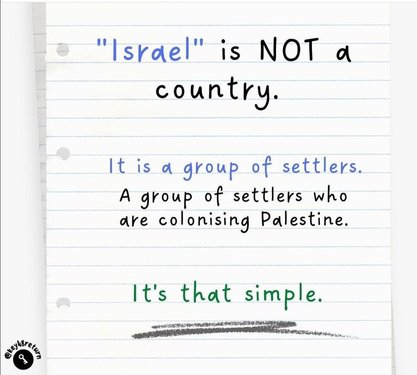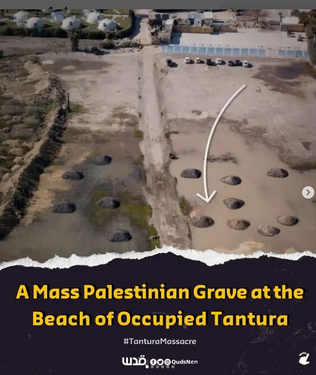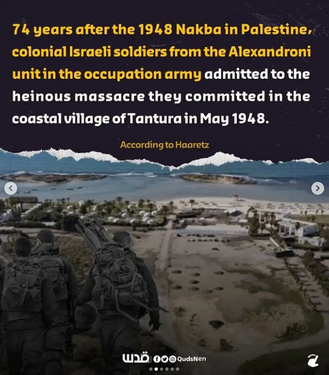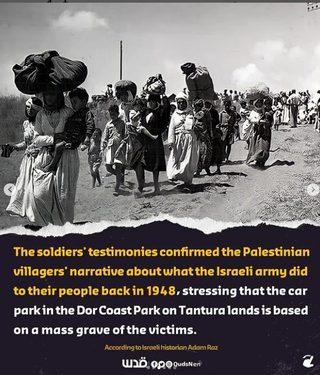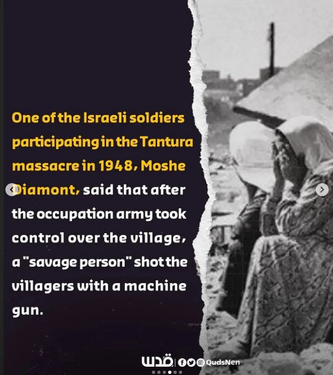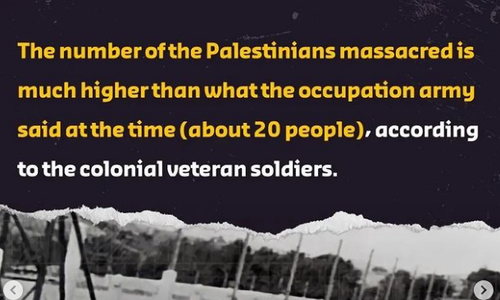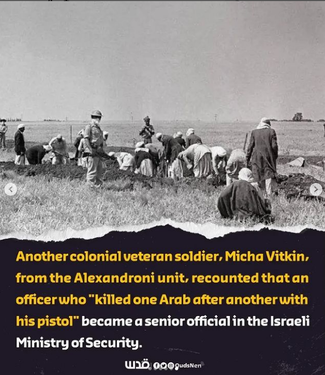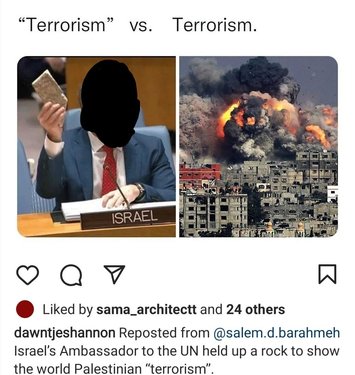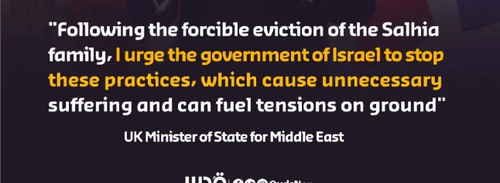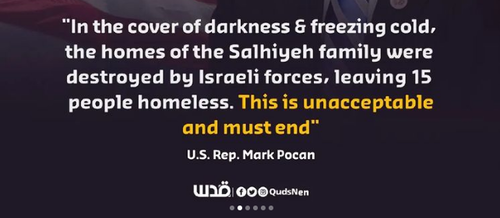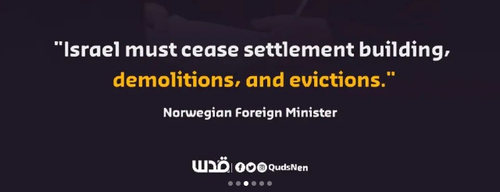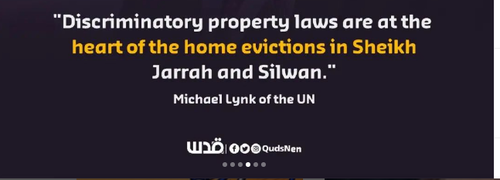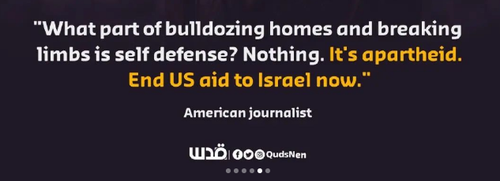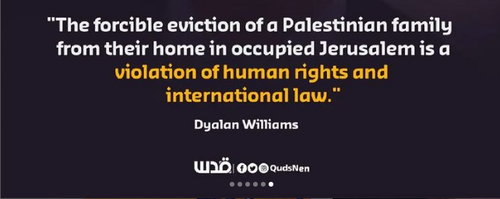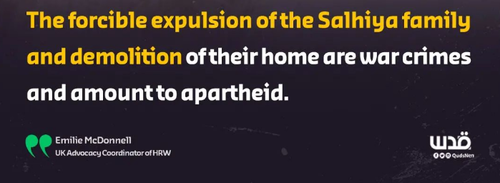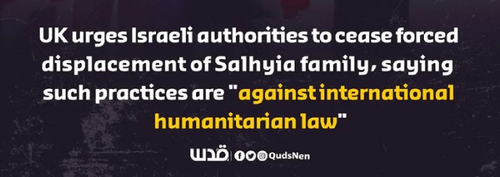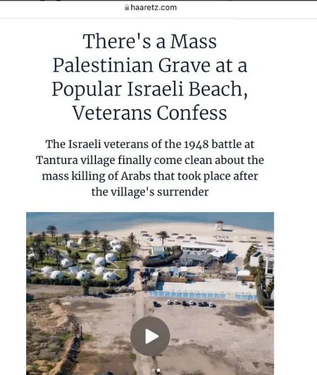-
Posts
8,465 -
Joined
-
Days Won
773
Content Type
Profiles
Forums
Events
Everything posted by ummtaalib
-
USA Australia Germany To all those denying ‘Israel’ is an apartheid state, take a look at this picture! This is what the ‘normal life’ of Palestinians in the occupied West Bank looks like. In an interview about Amnesty International’s new report on Israel’s apartheid against Palestinians, Amnesty’s Secretary General Agnes Callamard said:
-
The Biden administration and the Amnesty report The US considers Amnesty International a credible organization when they report on human rights conditions around the globe—so long as their reporting does not criticize Israel. The US’s denial of the consensus among human rights organizations—that Israel is practicing apartheid against Palestinians—points to a glaring hypocrisy: the US refuses to hear criticism of Israel, no matter how thorough it is, even when it comes from sources the US government itself otherwise deems credible. Whether they acknowledge it or not, Israel is practicing apartheid against Palestinians right now with the full support of the United States. It is time they are both held accountable. www.instagram.com/p/CZfkUNFo-ra/ Clip worth watching
-
True Appreciation of Rajab By Shaykhul-Hadīth, Hadrat Mawlānā Muhammad Saleem Dhorat hafizahullāh With the advent of Rajab, the seventh month of the Islamic calendar, Muslims remember the great miracle of the Beloved Nabī of Allāh ta‘ālā, the Mi‘rāj, which is commonly believed to have taken place in this month. During this miracle, Rasūlullāh sallallāhu ‘alayhi wasallam travelled with his body and soul from Makkah Mukarramah to Baytul-Maqdis, and from there to the seven heavens and beyond and returned all in a split second. The first part of the journey, from Makkah Mukarramah to Al-Masjidul-Aqsā, is called the Isrā and is mentioned in the Glorious Qur’ān. The second part of the journey, from Al-Masjidul-Aqsā to the heavens and beyond, is known as the Mi‘rāj. The great Mufassir ‘Allāmah Ibn Kathīr rahimahullāh has enumerated twenty-five Sahābah radhiyallāhu ‘anhum who have narrated this second part of the journey from Rasūlullāh sallallāhu ‘alayhi wasallam. With regards to Mi‘rāj and the month of Rajab, let us keep the following points in mind: • Auspicious nights such as Laylatul-Qadr, Laylatul-Barā’ah and Laylatul-Jumu‘ah are full of virtue and blessing, but the difference between them and the night of Mi‘rāj is that this night was prominent in blessings only on the particular night when Nabī sallallāhu ‘alayhi wasallam made this blessed journey. The blessedness and prominence does not return every year. Therefore, to make special arrangements of any sort or to engage in ‘ibādah during this night, assuming it to be blessed, is baseless. There is no record of Rasūlullāh sallallāhu ‘alayhi wasallam or the Sahābah radhiyallāhu ‘anhum celebrating the night of Mi‘rāj. • This great miracle is commonly believed to have taken place on the 27th night of the Islamic month of Rajab. However, the ‘Ulamā hold differing opinions about the exact date. Hāfiz Ibn Hajar Al-‘Asqalānī rahimahullāh, the commentator of Sahīhul-Bukhārī, has quoted more than ten different opinions for the possible date of Mi‘rāj. If this night was meant to be observed and spent in ‘ibādah, there would have been no difference amongst the Sahābah radhiyallāhu ‘anhum, for their ‘ibādah would have clearly defined the time of occurrence. • The incident of Mi‘rāj is truly an extraordinary event and a blessing not bestowed upon any other prophet, angel or other creation of Allāh ta‘ālā, neither before nor after. The correct way of truly celebrating and appreciating this great event is to remember the very precious gift that Allāh ta‘ālā sent for us on that night i.e. salāh. The performance of the five daily salāh is the Mi‘rāj for the believers, as through ṣalāh they receive the honour of conversing with Allāh ta‘ālā. Rasūlullāh sallallāhu ‘alayhi wasallam said: Allāh ta‘ālā says in a Al-Hadīthul-Qudsī: By understanding the position of salāh in Islām, one can conclude that only that person who values the gift of Mi‘rāj can truly claim to have understood Mi‘rāj. When the month of Rajab would arrive, Rasūlullāh sallallāhu ‘alayhi wasallam used to make the following du‘ā: Allāhumma barik lana fī rajabin wa sha'bān, wa balighnā Ramadān. O Allāh! Grant us barakah in the months of Rajab and Sha‘bān and make us reach the month of Ramadān. (Al-Mu‘jamul-Awsat) Therefore, it is desirable to recite this du‘ā on the advent of Rajab. Upon the commencement of Rajab, everyone should focus their attention on making preparations for the blessed month of Ramadān. This preparation is a spiritual one and entails fulfilling one’s duties to Allāh ta‘ālā, especially in areas where one is lacking. Preparing for Ramadān from the month of Rajab is just like getting into a car and putting it in first gear. Begin to observe the compulsory and obligatory acts from now so that by the time Ramadān sets in, you are in fifth gear practising many optional acts of worship as well. May Allāh ta‘ālā give us the tawfīq to practise upon His entire Dīn according to the teachings of our Beloved Nabī sallallāhu ‘alayhi wasallam, and may He enable us to start making preparations for the month of Ramadān from now. Āmīn. Extracted from 'Inspirations' (Part 1) © Islāmic Da'wah Academy
-
At The Approach of Rajab and Sha’ban With the sighting of the crescent of Rajab, Rasulullah (sallallahu ‘alayhi wa sallam) would anticipate and begin preparations for the month of Ramadan. This is two months in advance! People "live to see" various accomplishments in their lives, but a Believer "lives for" and yearns to witness sacred days like these. Rajab Du'a Sayyiduna Anas Ibn Malik (radiyallahu'anhu) reports that Rasulullah (sallallahu ‘alayhi wa sallam) would recite the following supplication when the Month of Rajab would commence: اَللّٰهُمَّ بَارِكْ لَناَ فِيْ رَجَبٍ وَشَعْبانَ وَبَلّغْنَا رَمَضَانْ Allahumma barik lana fi Rajabuw wa Sha'bana wa balligh na Ramadan Translation: Oh Allah! Grant us Barakah (Blessing) during (the months of) Rajab and Sha'ban, and allow us to reach Ramadan. Darul Hadith Research Centre
-
Destruction of Palestinian homes in East Jerusalem goes to ICC Israel is taken to the International Criminal Court as it continues to demolish Palestinian homes in the occupied territories. Beit Hanina, Occupied East Jerusalem – Nine people were injured and journalists were attacked by Israeli security forces this week as the Jerusalem Municipality demolished a two-story building and home of the Karameh family in the East Jerusalem suburb of Abu Tor on the pretext of being constructed without a building permit. The family of 15 was forcibly evicted by Israeli police while six of those injured required hospitalisation, according to the Red Crescent. Hundreds of Palestinians are facing forced expulsion from homes in East Jerusalem, which Palestinians want to be their future capital. But one family, the Salhiyehs, is taking the Israeli authorities to the International Criminal Court (ICC) after they were evicted from their home in Sheikh Jarrah in East Jerusalem last week, and the subsequent destruction of their home by the Jerusalem Municipality. “There is no justice, as an Israeli I don’t believe in my country any more. They have destroyed my life,” Lital Salhiyeh, 40, told Al Jazeera. Last week Lital’s husband Mahmoud, 43, several of their sons and their friends staged a demonstration on the roof of their house in Sheikh Jarrah, threatening to blow themselves up with a gas canister after the Israeli authorities attempted to evict them from the home they have lived in for decades. Several days later, during a cold and rainy night, Israeli special forces raided their home, arrested them at gunpoint, and beat them up. They were taken to prison for several days before their lawyer secured their release on bail. While Mahmoud was in jail their home was destroyed by the municipality, leaving 18 people homeless. “The police drove me past my destroyed home the next morning and showed me what they had done. We were not informed that the home would be destroyed,” Mahmoud told Al Jazeera. “Mahmoud and I knew that the eviction order was against us personally but not the rest of the family and neither was there a demolition order against our home,” said Lital from the home they have temporarily rented in the East Jerusalem suburb of Beit Hanina. “We lost everything and left with only the clothes on our back. I don’t even have pictures of my children,” Lital, who has been married to Mahmoud for 23 years, said. The couple has six children. A family agricultural nursery, where Mahmoud worked, and ancient olive trees on their plot of land were also destroyed. Lital, an animal lover, managed to rescue some of the family pets who were left stranded in the rain and cold after the family’s home was demolished. It was the second time the Salhiyeh family has been made refugees. In 1948 they were expelled from their home in the village of Ein Karem during the Arab-Israeli war. In 1984 Jerusalem Municipality’s district planning committee approved a building plan for the Sheikh Jarrah neighbourhood and designated the plot on which the family home and nursery were built for public building – even though other public areas can be found for this purpose without requiring the eviction of a family home. In July 2017, the municipality announced the expropriation of the plot of land, which Mahmoud’s parents purchased in 1958. The landowners filed an objection to the expropriation, but the court approved the expropriation and dismissed the objection. Critics argue the Israeli authorities are trying to Judaise East Jerusalem in favour of a higher Jewish demography. However, the Salhiyeh family is defiant and plans to take the Israeli authorities to the ICC in addition to launching an international campaign highlighting the case and those of other Palestinians facing eviction and home demolitions in East Jerusalem. “On Monday afternoon we held a Zoom meeting with our lawyers in London, Bindmans Solicitors, who are partnering with the International Centre of Justice for Palestinians [ICJP], in representing several other Palestinian families from Sheikh Jarrah,” family lawyer Walid Abu-Tayeh told Al Jazeera. “They are studying the documents and looking at all the details before deciding the next step and have been working on the case since October after we first consulted them. We don’t know when the case will be brought before the ICC but it could take a long time,” he said. “What made this all possible was an announcement in 2019 by the ICC prosecutor of the opening of an investigation into whether crimes committed in Palestine after June 2014 fell within the jurisdiction of the court,” said Abu-Tayeh. Expectations from ICC In 2021 the Pre-Trial Chamber of the ICC concluded the court’s territorial jurisdiction extended to the territories occupied by Israel since 1967: Gaza and the West Bank including East Jerusalem. “The ICC can now pursue Israel for war crimes,” said Abu-Tayeh. “The ICC could rule that Israel needs to rebuild the demolished house; that senior Israeli government officials involved in the demolition and eviction could be arrested if they travel abroad; and that all Israel’s actions in the West Bank such as land theft, the behaviour of the settlers, and other human rights abuses could also fall under the ICC’s jurisdiction so that individual settlers can be sued as well as collectively.” The Salhiyehs are taking other legal action as well. “We have also been in contact with several American senators in both the Senate and the Congress in regards to taking up our case to kick off an international campaign against the home demolitions and the evictions, and my brothers in the US are in contact with several law firms there too,” Abu-Tayeh said. East Jerusalem is illegally occupied under international law. The “extensive destruction and appropriation of property, not justified by military necessity and carried out unlawfully and wantonly” amounts to a grave breach of the 1949 Geneva Conventions and is considered a war crime, according to the 1998 Rome Statute of the ICC. Tensions have been building elsewhere in East Jerusalem, where Palestinians are either in the process of being displaced or have already been made homeless. Last week Israeli and Palestinian peace activists were attacked by Israeli security forces as they protested the pending eviction and destruction of the Salem family home. An Israeli settler who pulled a gun on the protesters was arrested. Hatem Abdel Khader, the Palestinian Authority’s former minister for Jerusalem, and who now coordinates Muslim and Christian efforts on behalf of the PA to prevent the Judaisation of East Jerusalem, told Al Jazeera the home demolitions and evictions were inflammatory and dangerous. “These are raising tensions and could provoke severe consequences. The international community needs to take action and the international courts have to get involved in the fight,” said Khader. Mahmoud Salhiyeh said he knows the battle ahead is going to be long and hard “but we won’t give up without a fight”. Crispin Blunt, UK member of parliament and director of the International Centre of Justice for Palestinians, said the Sheikh Jarrah case was already notorious. “ICJP is proud and privileged to stand alongside this family as they represent not just their own interests, but the century of historic injustice meted out to the Palestinian people individually and collectively,” he said. “For Israel’s sake, for all Palestinians and for humanity’s sake, the Sheikh Jarrah case needs to be a turning point where justice and our common humanity starts to count for more than people’s insecurities driven by fear.” Al-Jazeera
-
Amnesty International report accusing Israel of apartheid will cause attacks on Jews around the world — ADL claims News that Amnesty International will issue a report declaring Israel an apartheid state has caused outrage among Israel lobbyists, who see it as part of the tsunami of delegitimization that Israel's own leaders said it would face by refusing to grant Palestinians rights. The news is that Amnesty International is poised to issue a report tomorrow describing Israel as an apartheid state, thereby joining a list of other human rights organizations that reached the same conclusion in the last year, notably Human Rights Watch and B’Tselem — following Palestinian groups that documented the crime years ago. Source
-
How to Attain Khushuʿ 6: Persistently Ask Allah for Khushuʿ and Do Not Give Up Turn to Allah (‘azza wa jall) the Almighty with humility and beg Him to grant you the ability to perform your ṣalāh with khushūʿ. Have certainty in your heart that He will respond, as He so promised: “When My servants ask you about Me, truly I am near. I answer the call of the caller when he calls on Me; so let them respond to Me, and believe in Me, so that they may be guided” (2:186). You can make duʿā’ in your own language and ask Allah to bless you with khushūʿ. Alternatively, you may wish to memorise the following supplications of our beloved Messenger ﷺ and ask Allah (‘azza wa jall) through them: اَللّٰهُمَّ آتِ نَفْسِيْ تَقْوَاهَا ، وَزَكِّهَا أَنْتَ خَيْرُ مَنْ زَكَّاهَا ، أَنْتَ وَلِيُّهَا وَمَوْلَاهَا ، اَللّٰهُمَّ إِنِّىْ أَعُوْذُ بِكَ مِنْ عِلْمٍ لَّا يَنْفَعُ ، وَمِنْ قَلْبٍ لَّا يَخْشَعُ ، وَمِنْ نَّفْسٍ لَّا تَشْبَعُ ، وَمِنْ دَعْوَةٍ لَّا يُسْتَجَابُ لَهَا. O Allah grant my soul taqwā (piety and mindfulness) and purify it, for You are the Best of those who can purify it. You are its Protector and Master. O Allah, I seek Your protection from knowledge which does not benefit, a heart which does not submit, a soul which is not satisfied, and a supplication which is not accepted (Muslim). اَللّٰهُمَّ إِنِّيْ أَعُوْذُ بِكَ مِنْ صَلَاةٍ لَّا تَنْفَعُ. O Allah, I seek Your protection from a prayer which does not benefit (Abū Dāwūd). رَبِّ اجْعَلْنِيْ لَكَ شَكَّارًا ، لَكَ ذَكَّارًا ، لَكَ رَهَّابًا ، لَكَ مِطْوَاعًا ، إِلَيْكَ مُخْبِتًا أَوَّاهاً مُّنِيْبًا My Lord, make me one who is extremely grateful to You, who remembers you always, who perpetually fears You, who is fully obedient to You, who is humble before You, who constantly cries and pleads with You, and who frequently turns to You in repentance (Abū Dāwūd). اَللّٰهُمَّ أَعِنِّيْ عَلَىٰ ذِكْرِكَ ، وشُكْرِكَ ، وَحُسْنِ عِبَادَتِكَ. O Allah, help me to remember You, be grateful to You and worship You in an excellent manner (Abū Dāwūd). Never Give Up! Making the human lose hope is one of Shayṭān’s most powerful tricks. You might think: “This khushūʿ thing is not for me. I’ve tried it, but I keep getting distracted.” Do not give in to this trick and continue to try. On some days your level of khushūʿ will feel strong, whilst on others, you may not feel it at all. Despite all of this, continue to work on it and do not ever give up. Strive for a balance Achieving a balance is not always easy. Try to strike a balance between pushing yourself and over-doing it. Push yourself and fight your nafs to pray ṣalāh, working on both the quality and the quantity of your ṣalāh. At the same time, do not burden yourself with it so much that you find it challenging to maintain. For instance, you may attend an īmān-boosting lecture and therefore decide to get up an hour before Fajr to pray tahajjud. The first day or week may pass smoothly, but by the second week, you might start feeling like it is too much; you do not feel like waking up at all anymore, not even for 10 minutes. Rather than immersing yourself fully, build yourself up gradually over time. Try to be consistent as consistency is the key. The Messenger of Allah ﷺ said, “The best deeds in the sight of Allah are those which are constant, even if they are few” (Bukhārī). Accordingly, do not take an ‘all-or-nothing’ attitude. If your inner voice is saying, ‘Either I’m going to pray all of my voluntary prayers or none at all,’ then remember that it is better to pray some of them than to pray none of them.
-
Story of the Ethnic Cleansing of Yalu On this day 54 years ago, my family was ethnically cleansed from our village, Yalu. Israel violently erased us from our land, but never replaced us with settlers. It figures prominently in Israeli greenwashing campaigns. Our only crime was being in Israel's way. This is our story. During the 1948 Nakba, Zionist militias that later formed the Israeli army tried to conquer the Latrun villages (Yalu, Imwas, Bayt Nuba). Local resistance overpowered the Zionists' superior weaponry. My grandfather, an 18 year old orphan, was among those who defended our land. As Israel's Defense Minister in 1967, Moshe Dayan returned to Yalu, Imwas and Bayt Nuba with a personal vengeance due to the humiliating defeat that local resistance handed his battalion in 1948. He ordered the villages razed and its residents emptied. A Yalu elder was blind, and was crushed to death under the rubble of his own home in the 1967 conquest. He was unable to flee in time. I think of Israel's "warnings" to Palestinians of Gaza before they bomb their homes, giving them nowhere to seek shelter, when I think of him. Members of our extended family were missing for months. The people of Latrun were forced to move by foot towards either Ramallah or Jordan. My family ended up in Jordan. Each night, my grandfather would drive from refugee camp to refugee camp looking for his brother's family. Months. Months of your life go by, not knowing whether your family is living or dead. To this day, some members of my extended family still live in refugee camps. Any negotiated "peace" that excludes them is what Kanafani called a "conversation between the sword and the neck" Pieces of the homes remain. I love my great uncle. He doesn't say much, is quite stoic, has an acerbic wit. He's delivered some of the funniest one-liners I've ever heard. He wept when he recognized tile from his destroyed childhood home, visiting Yalu ~40 years after our Nakba. The villages of Yalu, Imwas and Bayt Nuba became "Canada Park," established by the Canadian Jewish National Fund. The US JNF has tax-exempt status while it attacks the grassroots justice movement that children of exile like myself helped grow. Canada Park is one of many examples of Israeli greenwashing, where it claims be environmentalist in order to obscure the settler-colonial violence its military used to empty Palestinian land, planting foreign trees in the place of razed Palestinian homes. https://pbs.twimg.com/media/E3UoXJPXMAUvkoJ?format=png&name=small Emile Habibi pointed to the absurdity of greenwashing in his 1974 novel "The Secret Life of Saeed: The Pessoptimist." The main character, a wise-fool, asked: "Was this why you demolished the Latrun villages, Imwas, Yalu, and Bait Nuba, and drove away their inhabitants, master?" We carry immense pain, just like the other 300,000 refugees of 1967, the 1948 Nakba refugees, and that of the people of Silwan and Sheikh Jarrah fighting settler-colonial erasure today. Their resistance today speaks to our stubborn refusal to abandon our liberation struggle. I was raised to know and love this land as if I had lived in Yalu myself. We are four generations living in exile. We plan to return together. Our elders did everything they could to spare us from the pain of dispossession, and we must honor their sacrifice by ending the Nakba. Hanna Alshaikh @yalawiya
-
Inhumane Israeli evictions and demolitions continue...The Karama family of Al-Tur town The crews of the occupation municipality evacuate a Palestinian home before demolish it, in Al Tur town in Jerusalem. All these fully armed Israeli soldiers were gathered to detain unarmed Palestine who was trying to defend his home from demolition by the Israeli occupation bulldozers in Al Tur town, today.Eye On Palestine (@eye.on.palestine) • Instagram photos and videos The Israeli occupation forces detained number of Palestinians after assaulting them while demolishing the demolition of Karama's family home in Al Tur town in Jerusalem. Eye On Palestine (@eye.on.palestine) • Instagram photos and videos A Palestinian child from the family of Karama hides behind the door of a car and blocks his ears during the demolition of his family home in Al Tur town, today. Eye On Palestine (@eye.on.palestine) • Instagram photos and videos The Israeli occupation forces attack journalists while covering the demolition of Karama family home in Jerusalem. Eye On Palestine (@eye.on.palestine) • Instagram photos and videos The rubble of Karama's family home which was demolished by the Israeli occupation authorities in Al Tur town in Jerusalem.
-

The Blessed Sunnah of Rasulullah ﷺ - Books
ummtaalib replied to ummtaalib's topic in Sunnah Practices
Beautiful Sunnah of Beloved Nabi Sualallahu Alaihe Wasallam By: Hazrat Maulana Shah Hakeem Muhammad Akhtar Saheb (rahmatullaahi 'alayhi) PDF -

The Blessed Sunnah of Rasulullah ﷺ - Books
ummtaalib replied to ummtaalib's topic in Sunnah Practices
The Blessed Sunnah of Rasulullah ﷺ - Volume 2 Download The Blessed Sunnah of Rasulullah ﷺ - Volume 3 Download -
The Blessed Sunnah of Rasulullah ﷺ - Volume 1 (Concise version) Jointly Published by: Wifāq ul Ulāma (SA) Madrasah Ta’leemuddeen, Isipingo Beach, Durban, South Africa Download
-
-
The Israeli occupation authorities demolish Al Araqeeb bedouin village in Al Naqab for the 197th time #savealnaqab
-
Reagrding the new facts Mohammed El-Kurd @m7mdkurd
-
New facts revelas massacre and mass grave of Plestinians New facts are being revealed about the heinous massacre of Tantura which was committed by Israeli occupation forces in 1948 New documentary revelas massacre and mass grave of PlestiniansThe documentary 'Tantura ' sheds new light on the massacre the of Palestinians after the conquest of Tantura village in 1948. The bodies of the villagers were buried in a mass grave. Via @trtworld Eye On Palestine on Instagram: "🇵🇸#Palestine | New documentary reveals massacre and mass grave of Palestinians. The documentary 'Tantura ' sheds new light on the massacre…"
-
The Israeli ambassador to the UN Gilad Erdan came to a Security Council meeting holding a rock to prove Palestinian "terror attacks with rocks". Eye On Palestine on Instagram: "🇵🇸#Palestine | The Israeli ambassador to the UN Gilad Erdan came to a Security Council meeting holding a rock to prove Palestinian "terror…"
-
Condemnation of Israeli forced expulsions Here is how representatives condemned the Israeli forced expulsion of the Palestinian family of Salhiya from Sheikh Jarrah neighborhood HRW's Communications Coordinator: "The forcible expulsion of the Salhiya family and demolition of their home in #SheikhJarrah are war crimes. This is what apartheid and persecution looks like. Perpetrators should be prosecuted & sanctioned."Human Rights Watch denounced on Wednesday Israel's demolition of Palestinian family house and forcibly displacing its 18 members, saying these are "war crimes" and "Perpetrators should be prosecuted and sanctioned." The British Consul General in Jerusalem, Diane Corner, joined on Monday other representatives of the European Union and like-minded countries to bear witness to the ongoing forced displacement of the Salhia family, who live and run a business opposite the British Consulate in East Jerusalem. Quds News Network (@qudsnen) • Instagram photos and videos
-
“They silenced it. It mustn’t be told; it could cause a whole scandal. I don’t want to talk about it, but it happened. What can you do? It happened."This is what the former Israeli soldier Moshe Diamant told the film director Alon Schwartz in a new documentary film that goes back to the affair of the Palestinian village #Tantura.Akevot’s researcher Adam Raz told Haaretz about the new testimonies about the battle of #Tantura, and about the code of silence among the soldiers who were there – and among all of us – that prevents any discussion about what happened.

